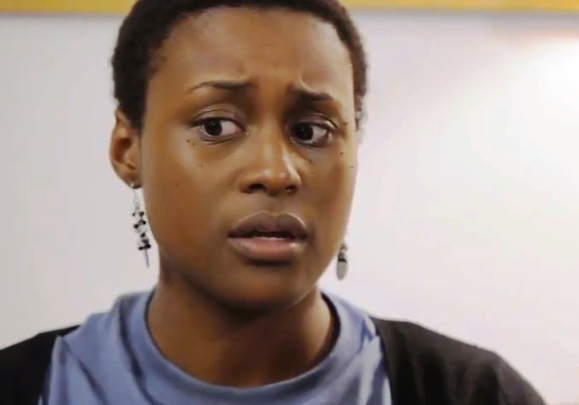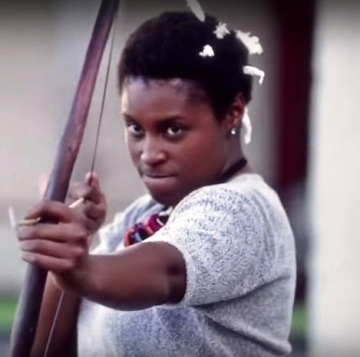According to TV Tropes, one of the coolest, most addictive wiki’s on the internet,
Tropes are devices and conventions that a writer can reasonably rely on as being present in the audience members’ minds and expectations.
Tropes aren’t bad in and of themselves bad and are not inherently cliché on account of their widespread use in mainstream media.
In fact, tropes can be very useful, particularly characters tropes, which can provide a firm foundation for character development and serve as a helpful cue to readers and viewers about the sort of character journey (and hence the sort of story) they can expect.
Where tropes do become tiresome, though, is when they’re used, not as a foundation, but as paint-by-numbers, same old same old characters in and of themselves. Tropes are also dreadfully dull when presumed to always fit a particular demographic mould.
One way to overcome this problem is by infusing tropes with some diversity, which is exactly what was done with the character J from the viral comedy web series The Misadventures of Awkward Black Girl.
J, as the title suggests, is an awkward, self-conscious, quirky, introverted, can’t-get-her-life-together sort of female trope (a Socially-Awkward Hero with shades of Clumsy Cute Girl) – a common one for female comedy characters, such as the eponymous Ally McBeal, Phoebe Buffay from Friends, Jess from New Girl, and Amy Farrah Fowler from The Big Bang Theory.
Where J is different, however, also from the title, is in the fact that she’s black, which mainstream socially awkward heroines almost never are.
The same, but different
J’s misadventures involve the usual fare of work, friends, love, and an utterly absurd ability to find discomfort in even the most banal of situations, such as repeatedly pulling up to stop signs alongside another driver, passing an oncoming person while walking down a long hallway, or participating in an icebreaker activity at work.
At the start of the series, J has just been dumped by her boyfriend, has cut off all her hair in a style that others claim makes her look like a guy, and is fending off the advances of a nerdy co-worker with whom she had drunken rebound sex at the office holiday party.
A significant amount of J’s awkward incidents occur at her job – a dead-end position as a sales rep for sketchy diet pills – where she’s surrounded by a wacky cast of colleagues, including,
- Nina, her attention-grabbing, former-soror supervisor who hates her
- Fred, a suave, good-looking new guy she begins stalking
- Darius, a guy who talks so softly, almost no one can understand him
- CeCe, her only slightly less awkward “besties before testes” BFF
- The boss of the company, known only as Boss Lady – a white poseur who thinks she’s black, calls J “girlfriend”, and tries to touch J’s hair.
The unique thing about J compared to other awkward girls is that while she’s a familiar character type navigating equally familiar circumstances, her experiences as a black woman offer a slightly different perspective on these circumstances, and inform her actions and reactions in ways that we don’t usually see.
An example of this is that one of the ways she deals with her various frustrations and setbacks is by composing violent (and at times comically bad) rap lyrics. An example:
I hope you wasn’t planning on living today, bitch, ‘cause imma kill you! I will slice you and dice you and throw you in a pan and burn you!
We are regularly graced with J’s inner dialogue, which unlike her almost preternatural ability to say the wrong thing in the wrong way at the wrong time, is snappy, biting, at times mildly offensive, and rife with street slang (including the N-word, which is often used colloquially by parts of the black community in the US.)
A level of racial and cultural tension underlines the entire series to both hilarious and satirical effect, such as the Islamophobic and other ethnic slurs regularly lobbed at CeCe, who is actually East Indian; the moralistic self-aggrandizing of a self-proclaimed Christian colleague who has named herself Sister Mary Clarence, and how, in her attempts to attract Fred, J is introduced to and begins seeing his friend Jay, who is white.
J has never dated a guy who wasn’t black, so this interracial relationship causes a minor uproar: there J’s ex-boyfriend, who pities her for it; CeCe, who loves it and refers to the first date as a “White Date” and “the interracial big leagues” that J has entered by completely skipping over brown and yellow; Fred, who all at once decides he does like J now that he has competition, resulting in the classic love triangle; random black women at parties, who accuse J of “killing black love”, and J herself, who constantly refers to him as “White Jay”.
Even though J is the architect of most of her own problems through her seeming inability to read a social cue and her at times passive-aggressive, defeatist attitude, you can’t help but root for her as she bumbles her way through the progressive steps of her relationship with White Jay (first kiss, first sex); as she endures the idiocy of team-bonding, group projects, anger management class, and inter-office politics at work, and then as she struggles to get a new, more meaningful job all together.
A circle of influence
It is in this search for a new job – the latter portion of J’s character arc – where the accessibility of her portrayal of the awkward girl trope is brought full circle.
When called in for a third interview for a job she really wants, J makes reference to the process being like the Hunger Games (her exact inner narration: “God, it feels like I’m competing for the Hunger Games in this bitch”) and proceeds to imagine an entire sequence where all the prospective candidates are duking it out with her starring as Katniss, complete with bow and arrows.
Here J, in being black, is bringing something new to a traditionally white character trope. Yet at the same time, she herself being influenced by mainstream media and casting herself in the role of someone ethnically different from herself.
People of colour are regularly expected to identify with an over-abundance of white characters in mainstream media, which we do.
However, the popularity of Awkward Black Girl (the series’ 24 episodes have been viewed more than 25 million times) as well as that of other diverse shows like Empire, Fresh Off the Boat, Jane the Virgin, and Black-ish, suggests that given the chance, white audiences are willing and able to identify with diverse characters as well.
It suggests that if more studio execs were willing to let go of their preconceived notions of what’s “relatable”*, a rich cross-cultural media exchange would occur. Not only would we see shades of ourselves in the “Other”, we’d see and appreciate all our differences as well as they apply to otherwise universal human experiences, thereby deepening our insight into the full breadth of the human condition in the process.
—
*Although Awkward Black Girl creator Issa Rae was hired by HBO two years ago to write a TV pilot for the series (which would be called Insecure), production is currently stalled due to the character J’s experiences not being seen as universal enough.
What are some of your favourite character tropes? Let me know in the comments.
(Image source #1 and #2)



Thanks. That was hilarious – and I’m always looking for suggestions for good shows.
The episodes are addictive. Now I have to block them to get some work done – but I have something to watch when I need a break!
LikeLike
I shotgunned the entire series in an evening, but the episodes are fairly short and work well as break rewards too. I really hope HBO gets its act together and launches Insecure (the TV version).
LikeLike
I recently discovered another good, unconventional show with a primarily black cast called Survivor’s Remorse. It’s a lot funnier than is apparent from the this teaser. i can’t speak for other white people, but I’m enjoying this show and some of the others you mentioned because they feel fresh and different.
LikeLike
I haven’t heard of that show; I’ll have to check it out!
LikeLike
It’s on after Blunt Talk, the new show with Patrick Stewart, which is very odd and funny by the way.
LikeLike
Hadn’t heard of that one either!
LikeLike
It’s too bad with Awkward Black Girl that the first few episodes are really poor quality. It’s a funny show, however, and as you say it casts a lot of new shades on old tropes.
That being said, I’m still not big on tropes. I liked her book better. I look forward to the day we have black characters on totally equal with white characters, being people, not “old-but-different” tropes or stereotypes.
LikeLike
Not even in her wildest dreams did Issa Rae likely imagine her little web series would take off like that. I will check out her book.
I don’t mind tropes that much. As I mentioned in the post, I think they can serve as a foundation. I believe that even the most finely-rendered characters can be deconstructed to the tropes at their base (indeed, TV Tropes makes gleefully sport of this). But I get what you’re saying: we need complex diverse characters in all sorts of different roles.
LikeLike
We’re actually discussing this very topic in a thread on Goodreads. About how there are tropes and stereotypes everywhere that can be “used for good” but they’re more visible with minorities because they get very little screentime. Which is why it’s so important with minorities (and female characters) to show diversity.
But, as you say, tropes can be used constructively. Issue with minorities is they’re mostly used because people can’t write minorities diversely. (Which obviously isn’t a problem for Issa Rae, so you’re right, for this show it’s used quite beautifully.)
LikeLiked by 1 person